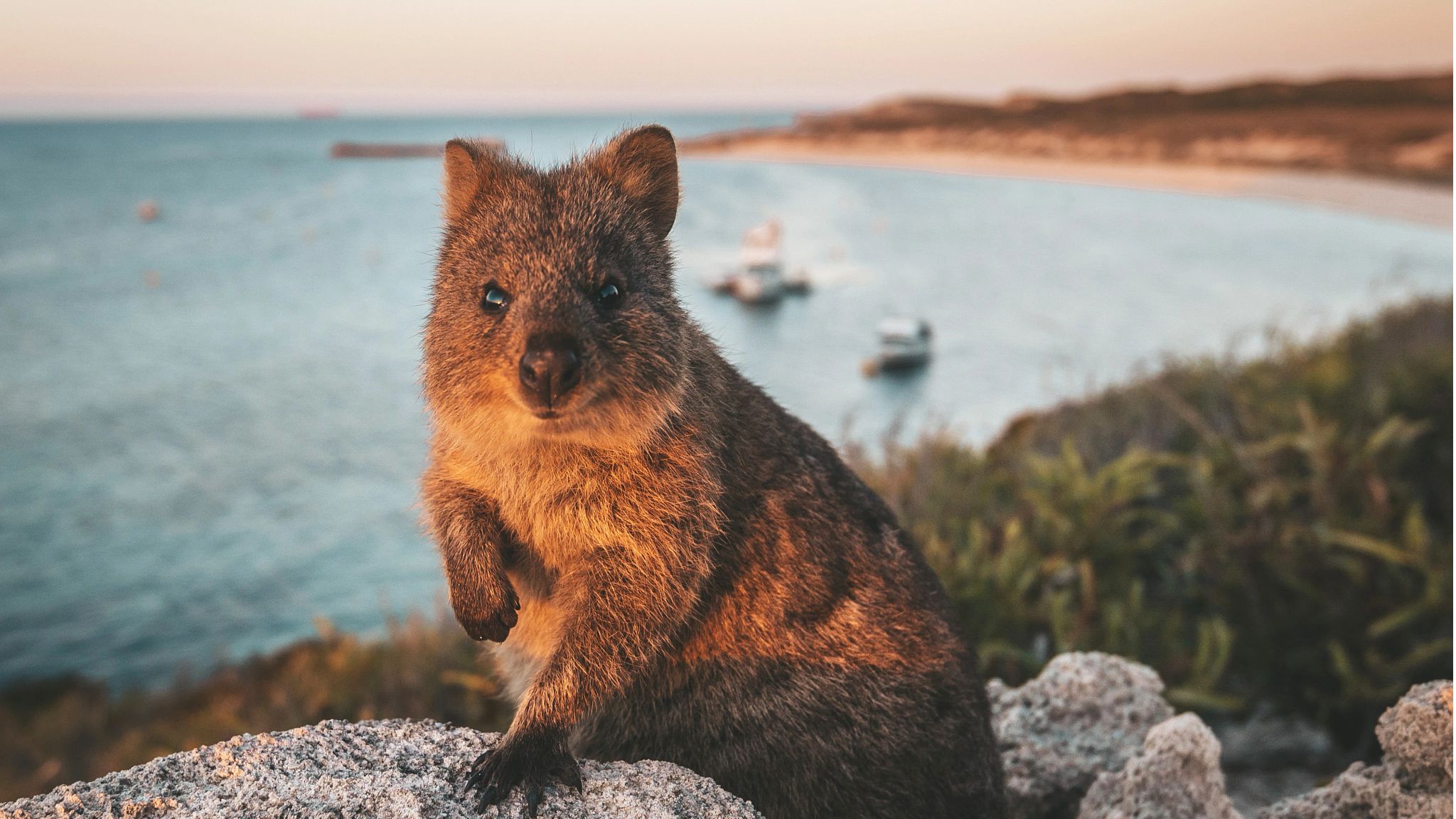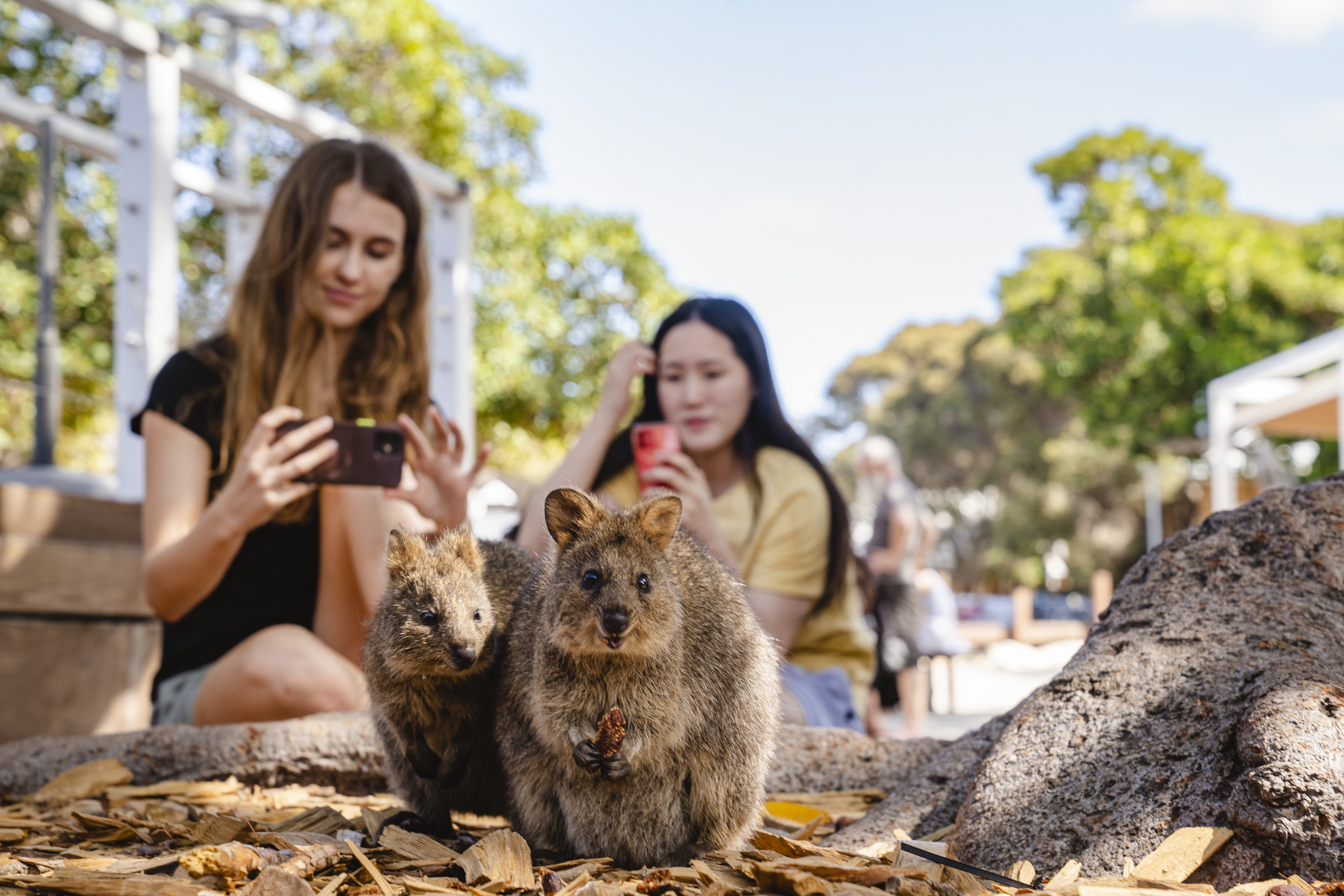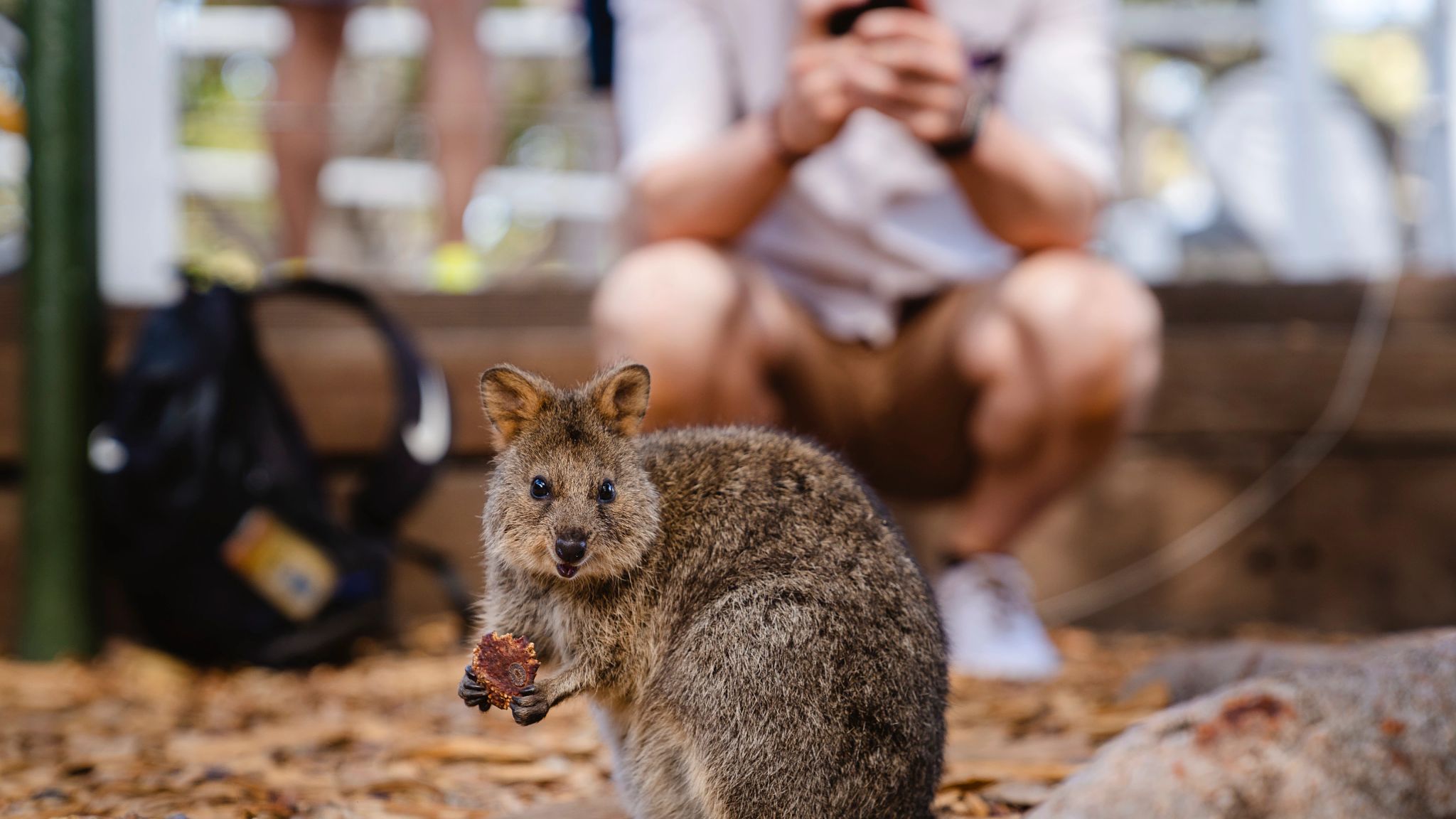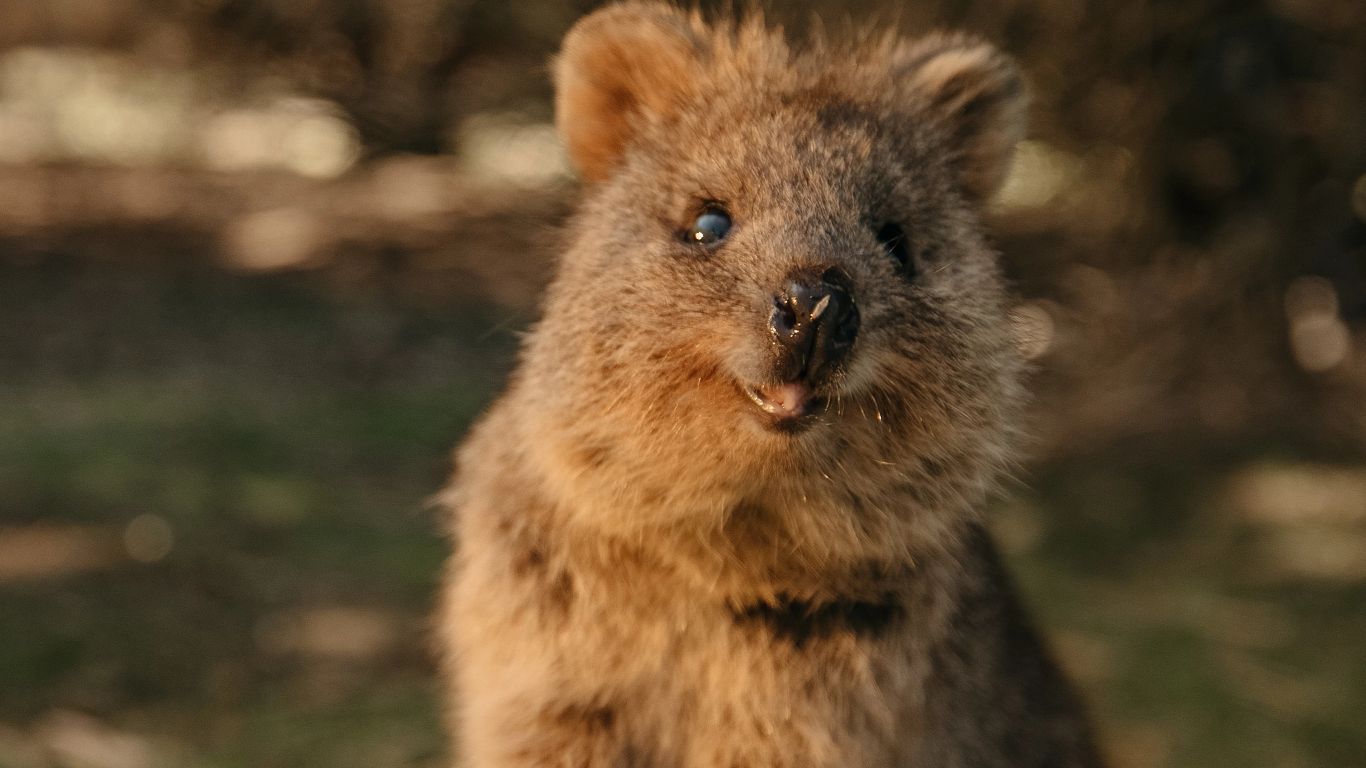Where to See Quokkas
Welcome to your quintessential guide on spotting one of Australia’s most adorable and friendly marsupials—the quokka—a.k.a. the happiest animal in the world (if you have seen a quokka selfie, you will agree)! This blog aims to demystify any pilgrimage to see these charming creatures in their natural habitats in Western Australia.
We’ll cover how to spot them, where they are commonly found, and the best way to maximise your chances of an unforgettable smiley encounter (and yes, we will give the scoop on nailing the classic quokka selfies, too). As you plan your Australia road trip, consider this your go-to quokka resource, rich with tips and essentials for spotting these little creatures during your campervan hire adventure. But first...
Are quokkas hard to spot?
Quokkas (Setonix Brachyurus) are classified as a threatened species due to habitat loss and predation. Only around 15,000 mature quokkas are left in the world. But don't worry—you don't have to climb trees to find these furry creatures.
Contrary to what one might think, quokkas are not as elusive as some of their marsupial cousins if you know where to look. Known for their approachable nature and ever-ready ‘smile’, quokkas are relatively easy to spot in their small colony locations throughout Australia.
These small, nocturnal animals are (somewhat counterintuitively) often active during the day in areas frequented by tourists, where they’ve grown accustomed to human presence.
On Rottnest Island, their primary home and main settlement, the quokka often roam freely, offering perfect photo ops and interactions that animal lovers dream of (for those equipped with a selfie stick).
While quokkas can also climb trees, which helps them access food sources, they will mostly be found pottering around town foraging for food. While they are more reserved in less visited areas, their curiosity often wins, making sightings fairly common.
Where are quokkas usually found in Australia?
Quokkas are quintessentially Western Australian, thriving in environments that range from small offshore islands to secluded mainland reserves. Mainland populations of quokkas are often found near dense streamside vegetation and shrubland.
Over the years, habitat destruction, such as inappropriate fire regimes and feral pig disturbances, significantly affects quokka survival. Clearing dense vegetation exacerbates habitat fragmentation and predator exposure, contributing to the quokka's ongoing decline. Biological conservation efforts are crucial in protecting these habitats and ensuring the survival of quokkas.
The most significant remaining populations are found on two offshore islands, including Rottnest Island, a veritable quokka island due to its ideal conditions and absence of natural predators. Lesser-known locales like Bald Island and pockets of the mainland, such as Two Peoples Bay Nature Reserve, also host a small colony of these smiley, wild animals.
For those venturing into Stirling Range National Park, keep your eyes peeled; you may spot these iconic animals exploring the underbrush. These protected and preserved areas offer not only sanctuary for the quokkas but also a rare glimpse into the biodiversity of Western Australia, often overlooked in typical travel itineraries.
 Image: Tourism Western Australia
Image: Tourism Western Australia
What’s the best way to spot quokkas in Australia? (pssst.... it's a campervan hire)
When it comes to wildlife exploration and experiencing Australia's natural beauty, travelling by campervan hire is unmatched. The flexibility to move from one scenic spot to another at your own pace allows for a deeper connection with the environment and, of course, better chances of encountering quokkas in their various habitats. An Apollo camper isn’t just a mode of transport; it’s your mobile base of operations (operation: find the happiest animal in the world).
Whether you’re waking up to the sounds of the sea on Rottnest Island or parked under the stars by Two Peoples Bay, your camper ensures you are exactly where you need to be for those magical wildlife moments. Equip your motorhome with essentials and hit the less-trodden paths—perhaps you’ll find quokkas foraging at dusk or playing in the early morning light.
Plus, with a campervan in Western Australia, you have the chance to couple your adventure with stays at family-friendly campgrounds to meet like-minded adventurers. Looking for recommendations on where to stay and other things to do during your Western Australia camper adventure? Check out our Western Australia guides:
Ready to see some quokkas? Let’s get to the good stuff.
Where to see quokkas in Australia
Quokkas are habitat specialists, thriving in areas with dense understorey vegetation. Whether you’re navigating in your campervan hire or hiking through pristine reserves, these spots offer more than just quokka sightings—they provide a full-on immersion into Australia’s natural beauty.
Quokka populations are found both on Rottnest Island and the mainland, with distinct subpopulations facing different challenges. These populations are affected by habitat fragmentation and predation, and their survival is influenced by environmental factors and management practices.
In this section, we’ll explore the best places to spot quokkas in Australia. From the famous Rottnest Island to lesser-known mainland locations, your quest to see these delightful creatures can be as adventurous as it is rewarding.
Rottnest Island Quokka population
Rottnest Island is the home to the largest population of quokkas, the island promises numerous wildlife sighting opportunities amidst some of the most picturesque settings in Western Australia. The Rottnest Island quokka population is the largest and most well-known. Looking for more reasons to visit Rottnest Island? Well, beyond the adorable quokkas, you’ll also find breathtaking beaches and panoramic views that enhance any visit (need we say more?).
Plus, with the density of the quokka population, you have easy access to free guides scattered across the island. These volunteers are invaluable resources for anyone wanting to learn a little about quokka conservation efforts, including their habitat protection, predator control programs, and how they are monitoring population dynamics to ensure their survival.
To get to Rottnest Island, ferries are available from Perth or Fremantle, making Rottnest Island easily accessible for a day trip or a longer stay. Before boarding the ferry, park your Apollo campervan at the designated parking areas in Fremantle or near the Perth ferry terminals, which offer secure spots for your vehicle for the day while you enjoy the island by foot or bike hire!
 Image: Tourism Western Australia
Image: Tourism Western Australia
Mainland populations locations
While Rottnest Island might be the star for quokka sightings, several mainland locations also offer the chance to see these unique animals in a more secluded setting. Quokkas are also found in the southern forests of Western Australia, which provide critical habitat. Here’s a look at three such spots:
-
Two Peoples Bay Nature Reserve: Located near Albany, this reserve is celebrated for its incredible biodiversity, including a smaller population of quokkas in southwest Western Australia. This southern forest is a haven for wildlife enthusiasts and provides a quieter alternative to the bustling Rottnest Island. For those travelling by campervan, the large parking area near the visitor centre offers ample space to park your motorhome while you explore the reserve’s trails and secluded beaches.
-
Stirling Range National Park: Known for its challenging hikes and breathtaking mountain vistas, Stirling Range is another gem where quokkas can occasionally be spotted climbing trees and, especially for those keen on combining wildlife watching with some trekking. Campervan travellers can also use the park’s designated camping areas, which are equipped to accommodate motorhomes, ensuring that every nature lover has a spot to rest.
-
Torndirrup National Park: Although quokkas are rarer in this national park of Western Australia, the park’s dramatic coastal scenery and the possibility of quokka sightings make it worth a visit.
Whether you’re looking to snap a selfie with a quokka or simply soak in the serene landscapes of Torndirrup National Park, these spots provide the perfect backdrop for your next family adventure. Ready to start your engine and embark on a memorable Australia road trip? Let’s go find some quokkas!
Quokka encounters in Australia
Experiencing a quokka encounter in Australia is an opportunity that is not to be missed. These friendly marsupials are known for their charismatic personalities and photogenic smiles, making them a favourite among families.
While spotting quokkas in the wild on places like Rottnest Island is a thrill, engaging with them in controlled environments such as zoos or wildlife reserves can be a close second when it comes to experiencing their charm and ensuring their safety and well-being.
For an unforgettable quokka encounter, consider visiting the Australia Zoo in Queensland. The Quite Cute Quokka Encounters allow you to step into their enclosure and feed them their favourite leafy treats. This unique experience lets you observe their playful behaviour up close and even participate in their daily routines.
Alternatively, at Featherdale Wildlife Park in Sydney, you can take a selfie with a quokka, capturing a memorable moment with one of Australia’s most beloved animals. These encounters not only provide a safe space for interactions but also contribute to the conservation efforts of these adorable creatures, ensuring they thrive for generations to come.
Our top tips for quokka spotting
Here are some top tips to consider when going quokka spotting in Western Australia:
 Image: Tourism Western Australia
Image: Tourism Western Australia
Stay quiet and move slowly
In places like the township of Rottnest Island, where the quokka population is more used to humans, you will likely have these creatures happily walking over to you. But in the more remote parts of Rottnest Island and the other smaller quokka populations, they will be more reserved. As such, the general rule for wildlife viewing is to approach gently to avoid startling them. If you wait and remain quiet, their curiosity often brings them closer if they feel secure.
Use a camera with zoom
Want to capture a classic quokka selfie? We recommend using a camera equipped with a good zoom lens to capture stunning photos from a distance without disturbing the quokkas. A selfie stick is also a great way to unobtrusively capture a picture with these animals while maintaining a respectful distance.
Pack a picnic
Many of the best quokka spotting locations are perfect for picnics. Enjoy the local scenery with a meal and keep an eye out for quokkas who might venture nearby. But just remember not to let the quokka eat any as human food isn't great for them.
Follow local guidelines
When visiting quokka populations, whether on Rottnest Island or on the mainland, be sure to adhere to the conservation rules provided by local authorities to ensure your safety and the quokkas’ well-being.
Do not touch or feed the quokkas
Feeding or touching wildlife can disrupt their natural behaviours and diet. Quokkas eat various types of vegetation, including grasses, sedges, leaves, and other native flora, but they do not do well with human food! So, as tempting as it may be to feed them, please only offer them their preferred diet.
 Image: Tourism Western Australia
Image: Tourism Western Australia
Stay on designated paths
When trying to spot a quokka, do your best to help preserve their habitat by sticking to marked trails and avoiding restricted areas.
Quokkas are a unique example of Australian mammals, known for their friendly nature and adaptability. By respecting these guidelines, you’ll not only enjoy watching quokkas but also contribute to their ongoing conservation.
Ready to see some quokkas?
That wraps up the best spots to spot the elusive quokka and how to responsibly enjoy their presence. Whether you’re planning a casual day trip or an extensive Australia road trip, the journey offers an incredible chance to connect with nature and make lasting memories.
Ready to start your adventure to see a quokka on Rottnest Island and the mainland of Western Australia? You can book your Apollo camper online and pick it up from any Apollo branch before you set off to meet these furry creatures. Armed with these tips and insights, you’re all set for a family-friendly quokka spotting experience. Grab your camera (and selfie stick), pack your bags, and get ready for some of the most adorable encounters Western Australia has to offer!